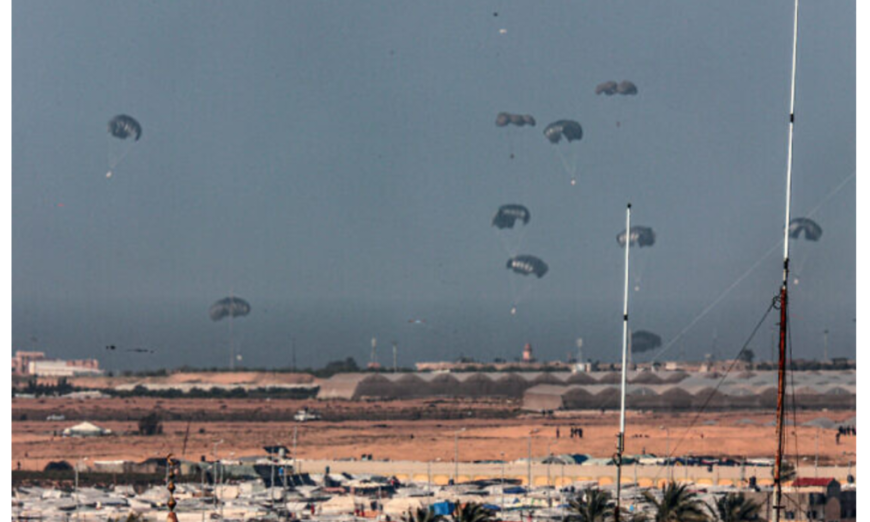A Jordanian military aircraft (not pictured) drops humanitarian aid over Rafah and Khan Younis in the skies of the southern Gaza Strip on February 27, 2024.
US President Joe Biden’s administration is considering airdropping aid from US military planes into the Gaza Strip as land deliveries become increasingly difficult, an American official told Reuters on Wednesday.
The Axios news site, which first reported the US was considering airdrops, cited US officials acknowledging such action would not be particularly effective, and that any large amounts of aid can only be moved in by land.
“The situation is really bad. We are unable to get enough aid [in] by truck so we need desperate measures like airdrops,” a US official said.
The Axios news site, which first reported the US was considering airdrops, cited US officials acknowledging such action would not be particularly effective, and that any large amounts of aid can only be moved in by land.
“The situation is really bad. We are unable to get enough aid [in] by truck so we need desperate measures like airdrops,” a US official said.
Also Wednesday, a Canadian cabinet minister said Ottawa was working to airdrop humanitarian aid to Gaza as soon as possible, as it explores new options to deliver aid.
Canadian International Development Minister Ahmed Hussen said the provision of airdrops in partnership with like-minded countries in the region, such as Jordan, was on the table. Jordan and other foreign nations have already airdropped supplies over southern Gaza.
Hussen said last week that the provision of aid is nowhere near what’s needed and a tedious inspection process was slowing down the movement of supplies brought in by truck. He made the comments following a trip to the Rafah border crossing, the only way in or out of Gaza since the Israel-Hamas war was sparked by the terror group’s October 7 atrocities, in which some 1,200 people were killed and 253 taken hostage.
The comments on potential US and Canadian airdrops came after Israeli officials said aid convoys carrying food reached northern Gaza this week, the first major delivery in a month to the devastated, isolated area, where the UN has warned of worsening starvation among hundreds of thousands of Palestinians who have not fled south amid the fighting.
A convoy of 31 trucks carrying food entered northern Gaza on Wednesday, the Israeli military office that oversees Palestinian civilian affairs said. The office, known by the acronym COGAT, said nearly 20 other trucks entered the north on Monday and Tuesday. Associated Press footage showed people carrying sacks of flour from the distribution site.
It was not immediately clear who carried out the deliveries. The UN was not involved, said a spokesperson for the UN’s humanitarian coordination office, Eri Keneko.
As of Sunday, the UN had been unable to deliver food to northern Gaza since January 23, according to Philippe Lazzarini, the head of UNRWA, the UN agency for Palestinian refugees that has led the aid effort during the war. On February 18, the World Food Program attempted a delivery to the north for the first time in three weeks, but much of the convoy’s cargo was taken en route by desperate Palestinians, and it was only able to distribute a small amount in the north. Two days later, the WFP announced it was pausing deliveries to the north because of the chaos.
Since launching its campaign against Hamas in response to the October 7 attack, Israel has barred entry of food, water, medicine and other supplies except for a trickle of aid entering the south from Egypt at the Rafah crossing and Israel’s Kerem Shalom crossing. Despite international calls to allow in more aid, the number of supply trucks entering has dropped dramatically in recent weeks.
COGAT said Wednesday that Israel does not impose limits on the amount of aid entering. Israel has blamed UN agencies for the bottleneck, saying hundreds of trucks are waiting on the Palestinian side of Kerem Shalom for aid workers to collect them.
UN spokesman Stephane Dujarric on Wednesday countered saying large trucks entering Gaza have to be unloaded and reloaded onto smaller Palestinian trucks, but there aren’t enough of them and there’s a lack of security to distribute aid in Gaza. The Hamas-run police in Gaza stopped protecting convoys after Israeli strikes on them near the crossing. There is also “insufficient coordination” from Israel on security and deconfliction, which the UN says puts the lives of staff and other humanitarian workers at risk.
“That’s why we’ve repeatedly asked for a humanitarian ceasefire,” he said. The UN has called for Israel to open crossings in the north to aid deliveries and guarantee safe corridors for convoys.
Along with blaming the UN for the fall-off in aid deliveries, Israel has called for the dismantling of UNRWA and its replacement with another entity after providing evidence that UNRWA employees participated in the October 7 attacks, that Hamas has used the UN organization’s facilities for terror purposes, and amid claims that a number of the organization’s workers are linked to Hamas.
Inside Gaza, desperate residents have halted convoys to seize aid from trucks as footage has shown gunmen, believed to be members of Hamas, stealing trucks delivering humanitarian aid from Egypt.
Israel has also long said that Hamas stockpiled supplies and kept them from increasingly desperate civilians.

